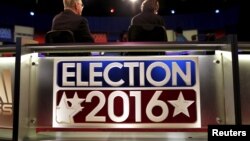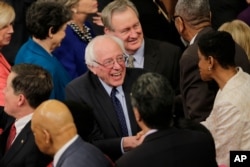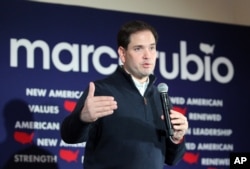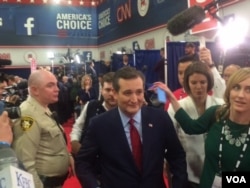At campaign stops across America, ultra-conservative Republican Senator Ted Cruz bellows a rhetorical challenge to his competitors for the party's presidential nomination. "When have you stood against Washington? When have you taken on, not just Democrats, but leaders in our own party?" Cruz asked recently in New Hampshire.
Cruz is not alone in slamming the ways of Washington.
"It's a two-party problem," said Senator Rand Paul, another Republican presidential hopeful. "These are two parties getting together in an unholy alliance and spending us into oblivion.”
Four current U.S. senators are running for president.
Cruz, Paul and Marco Rubio are competing among Republicans. On the Democratic side, Senator Bernie Sanders is challenging former Secretary of State (and former senator) Hillary Clinton.
Sanders does not dispute his status as a Washington insider. In fact, he speaks often and with pride about his work on Senate committees dealing with veterans' affairs and the environment.
By contrast, most Republican contenders cast themselves as outsiders fighting tooth and nail against the power of Washington, including Congress and the Senate in which they serve.
That anti-Washington message stands in contrast with Senate Majority Leader Mitch McConnell's eagerness to show that Republicans can govern and deliver on legislative promises.
"We want to continue to be the kind of Senate we were this year, focusing on things that could be achieved and turned into law," McConnell said at a year-end news conference in December.
Campaigning, not voting
"This is not going to be a productive year for Congress at all," said analyst Stan Collender at Qorvis MSLGROUP. "What you've got is Congress being used as a campaign tactic as part of the 2016 election."
Presidential campaigning is already having an impact on Senate attendance. Rubio has been criticized for missing multiple votes in recent months, and Cruz skipped President Barack Obama's State of the Union Address.
"The presidential candidates are not always going to want to tow the party line," said analyst John Fortier of the Bipartisan Policy Center. "They're sometimes going to be out of the Senate and not there for votes."
Given that Republicans have a slim, four-seat Senate majority, absences could affect vote tallies and whether legislation McConnell brings to the floor passes or fails.
Complicating matters further for the majority leader is that Republicans are defending twice as many seats as Democrats this year.
"Twenty-four of the 34 senators up for reelection this year are Republicans," Collender said. "About 10 of them are coming from states where they are vulnerable, where they are purple — they could be either red or blue, that is Democrat or Republican — or they are blue; they are Democratic states. So the elections are precarious."
Congressional control
McConnell's overriding goal of retaining a Republican majority could get tougher depending on which candidate gets the presidential nod.
Much attention has been paid to Republican businessman Donald Trump, who leads in national polls of Republican voters, but whose divisive rhetoric could alienate Independents in critical swing states. Analysts say a similar dynamic would emerge if the nomination goes to ultra-conservative hardliner Cruz.
"Mitch McConnell and Ted Cruz don't get along very well, if at all," Collender said. "If Mitch McConnell does anything to encourage Ted Cruz voters to come out and vote, he may be hurting the other senators who are up for reelection.
"I have talked to a number of Republican members of the House and Senate who say they are more interested in maintaining control of Congress than they are of winning the presidency," Collender added. "They would like to do both, but if it comes down to a choice between the two, retaining the majority in the House and Senate is more important to them."
For now, McConnell is steering clear of the presidential fray.
"We're going to do the job the American people elected us to do, and the presidential candidates will all slug it out," the majority leader said on ABC's This Week program.








